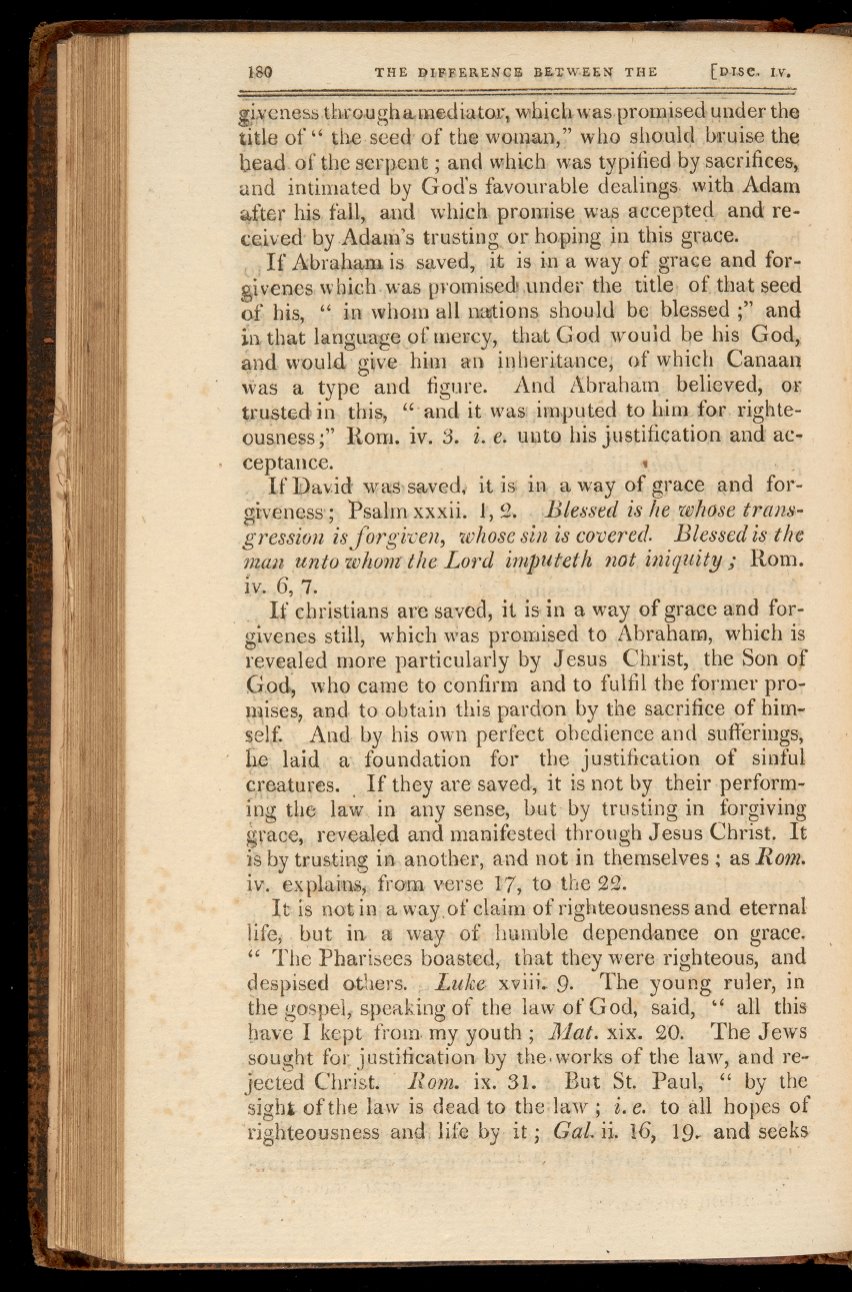

180
THE DIFFERENCE
33LTWEEN
THE
{DISC- IY.
L,iNenessthrougha.mediator, which
was promised-
under
the
title of
"
the
seed of
the woman,"
who
should
bruise
the
bead.
of the
serpent
;
and
which was typified
by
sacrifices,
and intimated
by
God's favourable
dealings. with Adam
after
his
fall,
and
which
promise
was
accepted and
re-
ceived
by
Adam's trusting
or
hoping
in this grace.
If
Abraham
is
saved,
it
is
in
a
way
of
grace and
for
-
givenes which was
promised
under
the title.
of that
seed
of
his,
"
in whom all
nations should
be blessed
;"
and
in
that
language
of
mercy,
that God
would
be his
God,
and would
give him
an inheritance;
of
which
Canaan
was
a
type
and
figure.
And Abraham believed,
or
trusted
in this
"-
and it
was
imputed
to him
for righte-
ousness;" Rom.
iv.
3.
i.
e.
unto
his
justification
and
ac-
ceptance.
If
David
was-saved.
it is
in,
a
way
of
grace and for
-
giveness; Psalm
xxxii.
1,
2,
.
-Blessed is he whose
trans
-
gression
is
forgiven,
whose
sin
is
covered.
Blessed
is
the
man ,unto whom
the
Lord
imputeth not iniquity
;
Rom.
iv. 6,
7.
I
Christians
are
saved,
it
is-
in
a
way
of
grace and for-
givenes still, which
was
promised
to Abraham, which
is
revealed more
particularly
by
Jesus
Christ, the
Son
of
God,
who
came to confirm and
to fulfil
the former pro-
mises,
and
to
obtain
this
pardon
by the
sacrifice
of
him-
self.
And
by
his own
perfect obedience and
sufferings,
he
laid
a
foundation for
the
justification
of
sinful
creatures.
If
they
are
saved,
it
is
not
by
their
perform-
ing
the
law
in
any
sense,
but
by
trusting in
forgiving
grace,
revealed and manifested through
Jesus
Christ.
It
is by
trusting
in another,
and
not
in themselves
;
as Rom.
iv. explains,
from verse
17,
to the
22.
It
is
not
in
a
way.of
claim
of
righteousness
and eternal
life;
but
in,
a
way
of
humble dependance on
grace.
The Pharisees
boasted,
that
they were righteous,
and
despised others.
-
Luke-
xviii.
9.
The young ruler,
in
the gospel; speaking
of
the
law
of
God,
said,
"
all this
have I
kept
from.
my
youth
;
Mat.
xix.
2.0.
The Jews
sought
for
justification
by
the.work:s
of
the
law, and
re
--
jected
Christ. Rom.
ix.
31.
But
St.
Paul,
"
by
the
sight
of
the
law
is
dead
to the
law
;
i.
e.
to
all
hopes of
righteousness and
life
by
it
;
Gal.
ii.
16,
19.
and
seeks

















